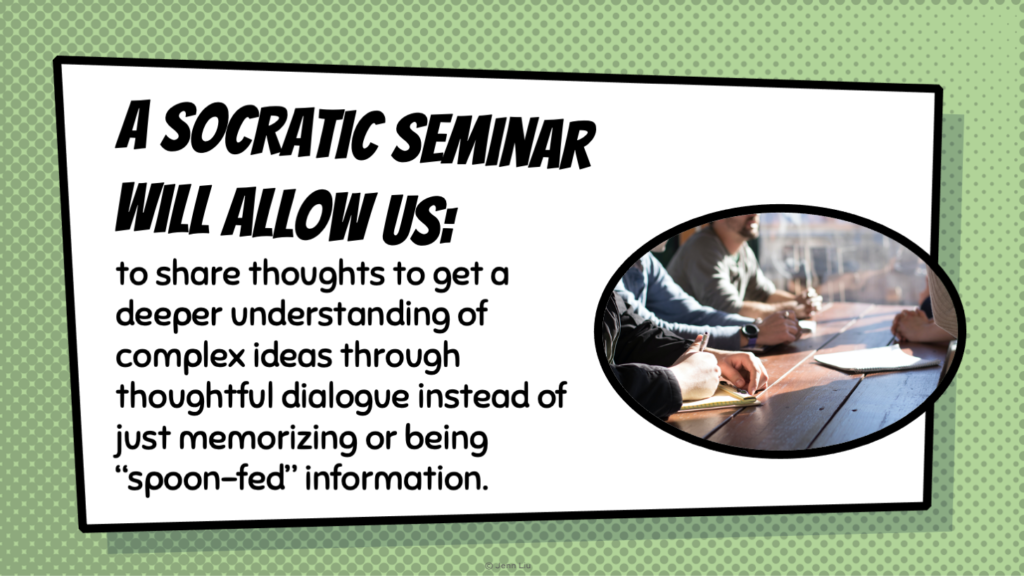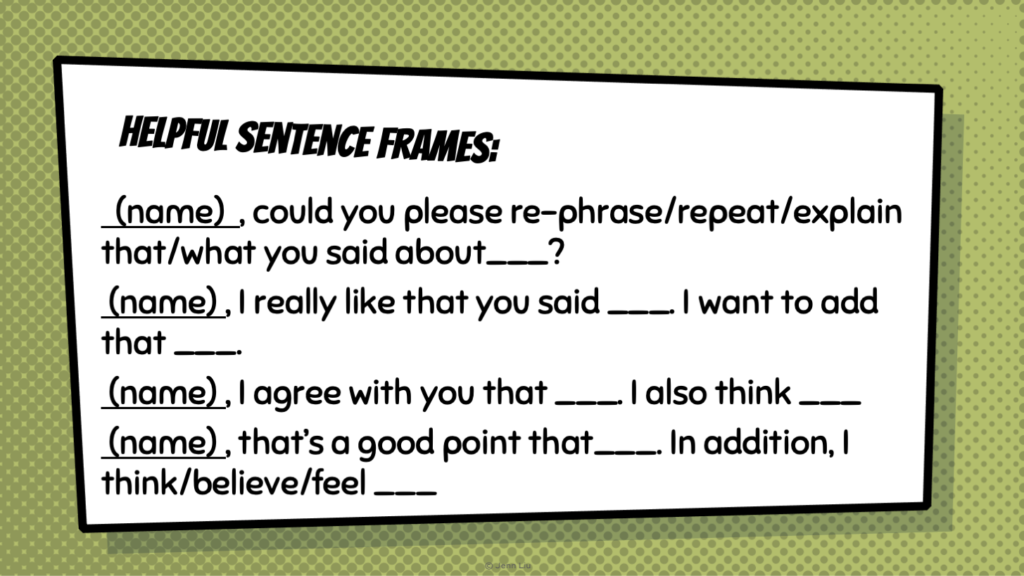I first learned about the idea of using Socratic seminars in the classroom back in 2012 when I became an AVID teacher. I attended the AVID trainings, studied the materials, and implemented my Socratic seminar lessons almost to a tee.

My student-led Socratic seminars seemed to go quite well, especially as my students got older and more mature (I looped with them from 7th to 12th grade). While they sat in one big circle taking turns sharing ideas, they were a bit fidgety as middle-schoolers, but by the 9th grade, I’d go as far as saying my AVID classes could win a Socratic seminar competition if there were such a thing!
I chose interesting topics related to what we were studying and prepared my students to make sure they’d have something to say. This meant assigning articles to read, requiring students to “mark the text” or take “focused notes,” and asking them to come to the seminars with open-ended questions and points backed by evidence to share.
Before beginning our seminars, we chose student facilitators, set ground rules, and reviewed useful sentence starters. Then I sat back and watched my students take over.

I was always so proud of them!
At the end of each seminar, I had my students reflect on both how they did as a class and individually. Then I patted myself on the back for a job well done.
But in the back of my mind, I knew the truth.
I had some issues with the Socratic method spoken so highly of among AVID teachers.
I felt it the first time I had to participate in a Socratic seminar with other teachers at my first AVID National Conference. As an introvert, I hated it. I’ll be frank — this forced discussion was annoying.
I sat nervously among the other AVID teachers. With the AC on too high as it always is in hotel conference rooms, the room was freezing, yet my palms felt sweaty. I was bored and anxious at the same time sitting there waiting patiently for a gap between the dominant speakers so I could sneak in my point and look like a good participant.
Even though we were told to follow the “three before me” rule, it seemed like certain teachers ruled the discussion. You know, just like at faculty meetings.
And that wasn’t the end of it. Back at work, I had to participate in about four more Socratic seminars with teachers as part of staff trainings or local AVID trainings. It never got better for me. I just don’t enjoy speaking in large groups no matter how prepared I am. Admittedly, I get social anxiety. Besides, I’m more of a listener.
But there I was making all my students participate in Socratic seminars several times a year because I thought I had to as an AVID teacher. My students never complained and I thought they did quite well. No one ever said, “I hate speaking in front of big groups.”
Or maybe they did, just not to me or perhaps to no one. But they had to think it, right? Now I wonder, why didn’t I ask?
Did I not want to know the answer because then I’d have to consider not having these large group discussions that seemed to go so well? It was bad enough I had reduced the number of times we were doing tutorials and stopped requiring students to carry around ridiculously huge binders (another part of the AVID curriculum). I couldn’t reduce or possibly cut out Socratic seminars too, could I?
And there was another issue I had with Socratic seminars that I didn’t admit early on but was quite aware of.
You see, when my students would have their discussions, I tried very hard to put on my poker face and hide how I felt. I had to correct my student facilitators who would respond to their classmates with “good point” and tell them to just give a more neutral response instead, such as “thank you” and call the next person waiting to speak.
When we respond with “good point” or a similar comment, head nod, or expression that shows approval or disapproval, we run the risk of students responding just to please the teacher or facilitator.
My issue was that even if I always tried to hang back during our seminars, I worried about whether the aim of a Socratic seminar to reach “deeper” and “mutual understanding” would cause groupthink or, dare I even say, indoctrination.

I’ll be honest (of course) — I worry about a certain colleague with extremist views ever trying a traditional Socratic seminar in his class. His students are almost better off with him just lecturing because then they can just ignore or dismiss the views they disagree with. This is easier than feeling pressured to hide their dissent to prevent getting on their teacher’s bad side — their teacher, with the almighty power to subjectively grade them.
This makes me wonder: Does the Socratic seminar rule to “dialogue not debate” prevent students with very different viewpoints from saying what they really think?
Perhaps this explains why my students said they liked doing Philosophical Chairs better. This is an activity/technique/discussion format that requires students to express their views by taking a side on an issue by moving to one side of the room and then defending their stance.
I get that we need to teach students to find common ground, especially now more than ever when “our country is so polarized” (in quotes because I seem to hear this so much). And I do agree with this, which is why I still believe in having Socratic seminars, but only if these discussions are carried out with the tips I mention in the blog post referred to at the end of this post.
However, as a fan of Elie Wiesel’s memoir Night, I must remind us all of what Wiesel said in his 1986 Nobel Peace Prize acceptance speech: “We must always take sides. Neutrality helps the oppressor, never the victim. Silence encourages the tormentor, never the tormented.” No, this doesn’t always apply to every topic discussed in a Socratic seminar. We often just have seminars on very light and fun topics too.
Now here’s the worst part.
When my AVID class went to distance learning at the beginning of the pandemic, I continued doing Socratic seminars orally but through video conferencing. Again, I was so proud of my students. But, I should’ve known better. I had this great opportunity to break my students up into small groups/breakout rooms or have them participate by posting their thoughts in a chat or Jamboard.
I heard about other teachers doing this but I thought to myself: Then that wouldn’t actually be a Socratic seminar! It must be a whole-class oral discussion like I was taught!
I cringe now. Yes, sometimes we should force our students out of their comfort zone. Yes, oral class discussions can help my students prepare for their future college discussions. And yes, I could just teach them strategies for getting over their anxieties about speaking in front of large groups.
You know, anxiety-reducing self-talk such as: “Don’t think so much about yourself; instead, focus on how you can help your audience.” Blah, blah, blah.
Should we push students out of their comfort zone to speak in front of class? The extroverts who can’t relate might argue so. I prefer to let students speak when they’re ready. There’s always the more formal oral presentation assignment for that. This is different because there isn’t the feeling of competing to speak and can be 100% prepared for (as a side note, even with formal oral presentations, I’ve allowed very shy students an alternative and they almost always eventually present in front of the class when they’re ready).
So here’s what I know: After years of experience speaking in front of large groups (e.g., countless meetings), I still don’t like it. And I still don’t find very large group discussions as productive and effective as allowing people, whether your colleagues or students, to express themselves in small groups and in writing.
Keep in mind the purpose of a Socratic seminar is for students to hear different perspectives and gain a deeper understanding on a topic. For this to happen, they must share their thoughts with each other. From my experiences, students always share more openly and honestly in small groups, and even more in writing.
Alright, I don’t have empirical evidence to back this up, but 30 years of teaching experience also tells me when students share orally, they’re more likely to play it safe, not rock the boat too much, and be more agreeable — in other words, go into groupthink mode. By the way, I teach in a public school in Hawai’i, where our culture embraces working together and humility.
And now for the good part.
After teaching AVID for over 10 years (yes, it took me a while), I’ve now become a rebel teacher. I don’t do everything in the infamous AVID WAGS (“Weeks at a Glance”) planning guide and I do things how I see best and fit for my students and their success.
The Socratic seminar can indeed be a slippery eel. It can also be a powerful teaching tool if you use it with careful planning to benefit all students. Read my blog on 10 Powerful Tips Every Teacher Needs to Have a Better Socratic Seminar for ideas to make it work for your students.
Click here to get my FREE Socratic Seminar rubric, which can also be used for self-assessment. You might also like this complete Socratic Seminar Lesson Plan.
If you found this article helpful, share it with your teacher friends and colleagues!
Bold font